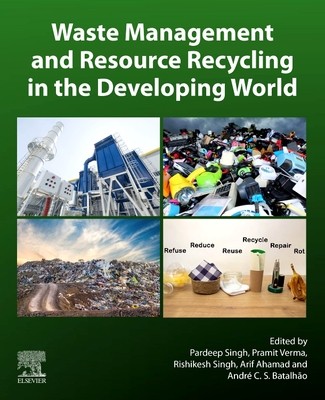
- We will send in 10–14 business days.
- Publisher: Elsevier
- ISBN-10: 0323904637
- ISBN-13: 9780323904636
- Format: 19.1 x 23.5 x 4.4 cm, softcover
- Language: English
- SAVE -10% with code: EXTRA
Waste Management and Resource Recycling in the Developing World (e-book) (used book) | bookbook.eu
Reviews
Description
Waste Management and Resource Recycling in the Developing World provides a unique perspective on the state of waste management and resource recycling in the developing world, offering practical solutions based on innovative tools and technologies, along with examples and case studies. The book is organized by waste type, including electronic, industrial and biomedical/hazardous, with each section covering advanced techniques, such as remote sensing and GIS, as well as socioeconomic factors, transnational transport and policy implications. Waste managers, environmental scientists, sustainability practitioners, and engineers will find this a valuable resource for addressing the challenges of waste management in the developing world.
There is high potential for waste management to produce energy and value-added products. Sustainable waste management based on a circular economy not only improves sanitation, it also provides economic and environmental benefits. In addition to waste minimization, waste-to-economy and waste-to-energy have become integral parts of waste management practices. A proper waste management strategy not only leads to reduction in environmental pollution but also moves toward generating sufficient energy for improving environmental sustainability in coming decades.
EXTRA 10 % discount with code: EXTRA
The promotion ends in 14d.15:54:00
The discount code is valid when purchasing from 10 €. Discounts do not stack.
- Publisher: Elsevier
- ISBN-10: 0323904637
- ISBN-13: 9780323904636
- Format: 19.1 x 23.5 x 4.4 cm, softcover
- Language: English English
Waste Management and Resource Recycling in the Developing World provides a unique perspective on the state of waste management and resource recycling in the developing world, offering practical solutions based on innovative tools and technologies, along with examples and case studies. The book is organized by waste type, including electronic, industrial and biomedical/hazardous, with each section covering advanced techniques, such as remote sensing and GIS, as well as socioeconomic factors, transnational transport and policy implications. Waste managers, environmental scientists, sustainability practitioners, and engineers will find this a valuable resource for addressing the challenges of waste management in the developing world.
There is high potential for waste management to produce energy and value-added products. Sustainable waste management based on a circular economy not only improves sanitation, it also provides economic and environmental benefits. In addition to waste minimization, waste-to-economy and waste-to-energy have become integral parts of waste management practices. A proper waste management strategy not only leads to reduction in environmental pollution but also moves toward generating sufficient energy for improving environmental sustainability in coming decades.


Reviews